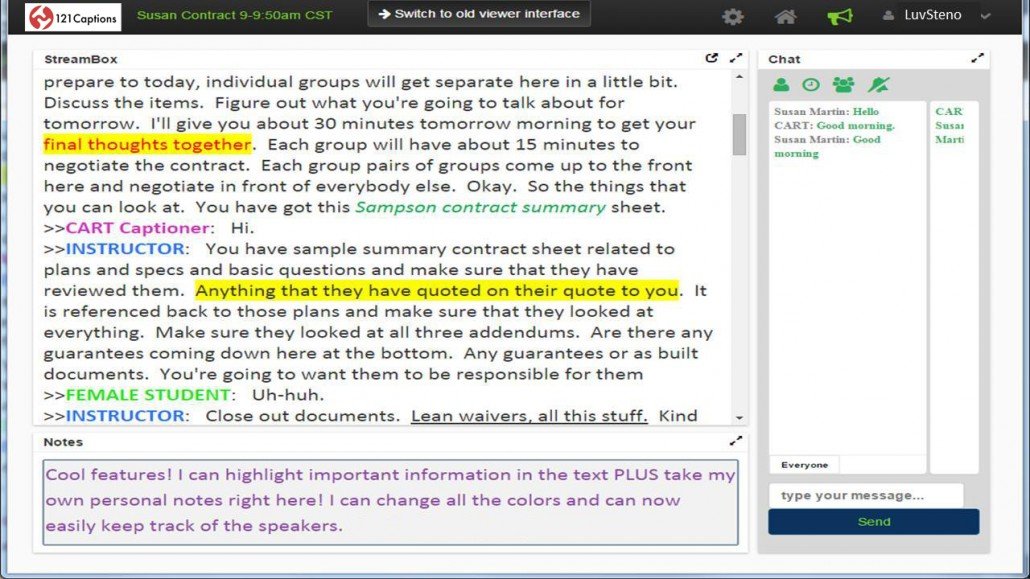Get a better education with a 121 captioner
At 121 Captions we have a unique understanding of captions for education. Some of our team are higher education careers consultants and know the demands of being a HE learner.
A 121 captioner allows deaf students to participate effectively in their course.
With their expert support and high-speed streaming our captioner enables ‘deaf students’ to become simply ‘students’.
There are various organisations providing captions in education. It can be hard to measure one captioner provider against another.
To help students and their advisors in their search we have compiled a quick 10-point checklist.
Ten questions to ask
-
-
What is the quality of captions?
-
A verbatim 121 captioner uses Speech to Text Reporting (STTR). It is much more accurate (the industry average is 98%) than respeaking, and the text output is quicker.
-
-
How fast are captions streamed?
-
It’s hard for deaf students to have an equal learning experience to their peers if they receive captions later than everyone else hears those words, or the text arrives in chunks that don’t make sense. A 121 captioner can stream live captions word by word at up to 300 words a minute. So deaf students can keep up with the rest of the class.
-
-
What kind of captioners do they offer?
-
121 Captions offers onsite and remote captioners, verbatim and non-verbatim. Two types of captioners are available: Speech to Text Reporter (STTR): captioning word for word with only a 1 second time lag. Streamed at up to 300 words per minute. This captioner enables students to read the lecture, word by word, at the same speed as their peers hear, and to answer questions, participate in discussions and make comments with the same ease. Electronic notetaker: the cheaper option. Gives students a summative output of what is said. An electronic notetaker is ideal for those who prefer a slightly less verbatim output but who still want realtime access. Streamed at up to 150 words per minute. Within the UK, our captioner services can also be provided on-site, with your nearest captioner or electronic notetaker being sent to you.
-
-
Is the captioner provider accountable for the service they provide?
-
A 121 speech to text reporter or electronic notetaker is carefully selected to ensure they meet the 121 quality guarantee. 121 captioners are registered and accredited by internationally-recognised professional associations, all of which have high qualification requirements and abide by codes of conduct, eg confidentiality.
-
-
Does the captioner provider offer value for money?
-
As our high-quality captioner services are provided remotely, the minimum period we charge for is just one hour.
-
-
How easy is it for students and lecturers to use the captioning system offered?
-
The 121 speech to text reporter or electronic notetaker receives the audio of lessons and tutorials wirelessly streamed from a lapel microphone and via a teleconference call or Google Hangout, Skype etc. The student then receives their captions directly to their smartphone, tablet or laptop, whichever suits best.
-
-
Do students receive a transcript?
-
The 121 captioner sends a helpful first-draft transcript of the captions to the student right after captioning has finished. Lecturers may also have a copy as a useful review of lectures and their teaching style.
-
-
How flexible is their captioner scheduling?
-
With a network of over 300 captioners, we can provide a captioner at short notice and easily accommodate changes to scheduled teaching.
-
-
What about cancellation fees?
-
Cancellation fees are avoided with only 24 hours’ notice needed of a reschedule or cancellation.
-
-
Will the student be comfortable using their captioner or electronic notetaker service?
-
Not every deaf student wants to broadcast their struggle to hear. In a world where laptops and tablets are commonplace in the lecture hall, a 121 captioner provides discreet and effective support for students.
To find out more about using a 121 captioner to support deaf students in education, contact us.
Notetaker case study
Natalie, MSc Positive Approaches to Challenging Behaviour, Cardiff University School of Medicine
I became totally deaf during my final year of my part-time Master’s degree. 121 Captions made it possible for me to continue with my supervised fieldwork toward professional accreditation. I have had captions online for group Skype supervision meetings, Skype meetings and in a variety of settings to provide remote speech-to-text with clients and colleagues. I wish I had known about 121 Captions earlier in my postgraduate & undergraduate degrees, it would have made university so much more accessible to me, instead of waiting for and relying on transcripts and lecture notes. 121 Captions worked very hard and at short notice to get me remote captions during my graduation ceremony when I received my MSc. The captions were also streamed directly to a second iPad for my mother, who is profoundly deaf too. We were both able to relax and both enjoy full access to the ceremony, which I think is a first for us in an educational event. I cannot thank 121 Captions enough for making it possible for me to be included at my graduation, and also for making it possible for me to obtain my supervised practice.


